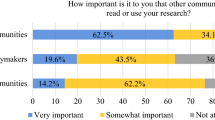Abstract
Social scientists can explore questions about what counts as knowledge and how researchers—including social science researchers—can produce that knowledge. An art/space installation examining issues of public participation in science demonstrates the process of co-creation of knowledge about public participation, not simply the co-creation of the meaning of the installation itself.



Similar content being viewed by others
References
Bell, P., Lewenstein, B. V., Shouse, A., & Feder, M. (Eds.). (2009). Learning science in informal environments: People, places, and pursuits. Washington, DC: National Academies Press.
Brossard, D., & Lewenstein, B. V. (2009). A critical appraisal of models of public understanding of science: Using practice to inform theory. In L. Kahlor & P. Stout (Eds.), Communicating science: New agendas in communication (pp. 11–39). New York: Routledge.
DiClemente, R. J., Crosby, R. A., & Kegler, M. C. (2009). Emerging theories in health promotion practice and research (2nd ed.). San Francisco, CA: Jossey-Bass.
Garvey, W. D. (1979). Communication: The essence of science—Facilitating information exchange among librarians, scientists, engineers and students. Oxford, NY: Pergamon Press.
Gastil, J. (2008). Political communication and deliberation. Thousand Oaks, CA: Sage.
Greenwood, D. J., & Levin, M. (2007). Introduction to action research: Social research for social change (2nd ed.). Thousand Oaks, CA: Sage Publications.
Hilgartner, S. (1990). The dominant view of popularization: Conceptual problems, political uses. Social Studies of Science, 20(3), 519–539.
Horst, M. (2011). Taking our own medicine: On an experiment in science communication. Science and Engineering Ethics. doi:10.1007/s11948-011-9306-y
Latour, B. (1987). Science in action: How to follow scientists and engineers through society. Cambridge: Harvard University Press.
Lewenstein, B. V. (1995). From fax to facts: Communication in the cold fusion saga. Social Studies of Science, 25(3), 403–436.
Minkler, M., & Wallerstein, N. (2008). Community based participatory research for health (2nd ed.). San Francisco, CA: Jossey-Bass.
Shinn, T., & Whitley, R. (Eds.). (1985). Expository science: Forms and functions of popularisation (Sociology of the Sciences, Vol. 9). Dordrecht, Boston, Lancaster: D. Reidel.
Author information
Authors and Affiliations
Corresponding author
Rights and permissions
About this article
Cite this article
Lewenstein, B.V. Experimenting with Engagement. Sci Eng Ethics 17, 817–821 (2011). https://doi.org/10.1007/s11948-011-9328-5
Received:
Accepted:
Published:
Issue Date:
DOI: https://doi.org/10.1007/s11948-011-9328-5



